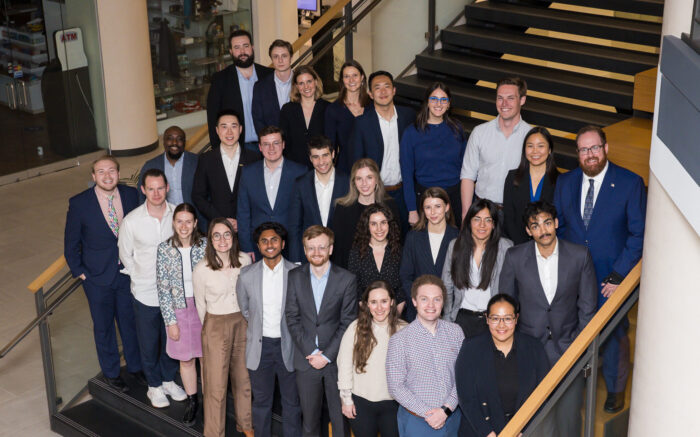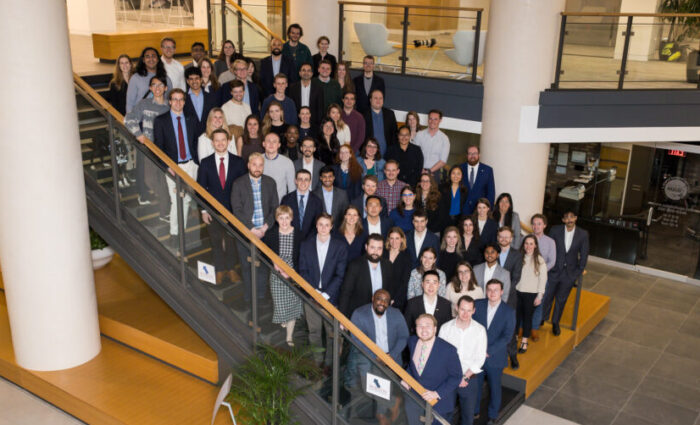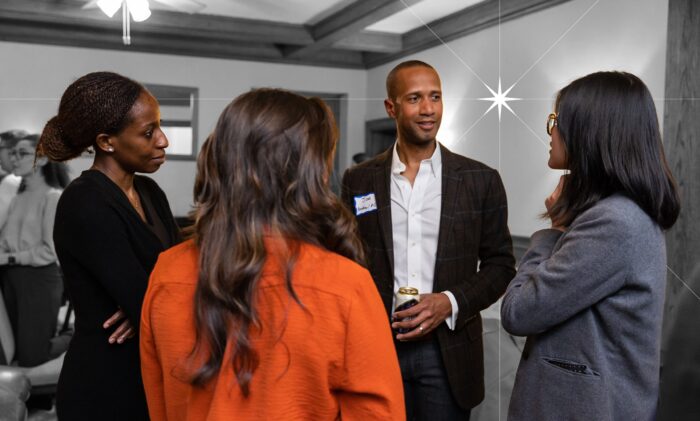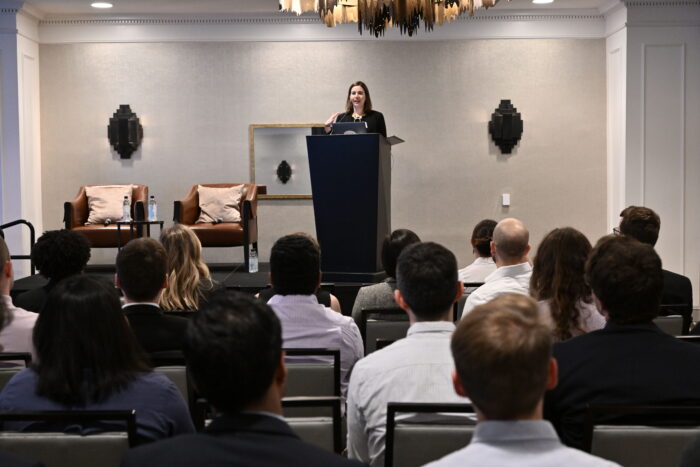Fellow Q&A: Krystal Jackson
This is part of our fellow Q&A series to give prospective applicants and other interested audiences a glimpse at what it’s like to be a Horizon Fellow.

Before starting the fellowship, you worked as a public interest technology fellow at Carnegie Mellon University, where you studied information security, public policy, and physics. How did that experience shape your current policy interests?
As an undergraduate doing physics research, I did a lot of data analysis. I came to realize that a lot of the analysis methods that I was using in physics were also being used on data about real people to make consequential decisions around education, housing, health care, and more.
This realization made me interested in the space of data ethics and algorithmic justice. I decided to combine that focus on justice with cybersecurity, because cybersecurity touches everything: data privacy, information security, and so much more. I thought that cybersecurity would be a really good foundation to build on. I knew a couple of people who were working at the intersection of cybersecurity and human rights issues when the Pegasus spyware became public knowledge, which made me more interested in surveillance and other issues in emerging technology. One of my focuses has also been the intersection of race, gender, technology, and how data can be weaponized.
All of those interests and experiences led me to become a public interest technology fellow with the Census Bureau. My team was very interested in mitigating discrimination in government datasets and algorithmic applications of them. I was doing a lot of research into the kind of methodologies that might prevent discrimination. With that fellowship opportunity, I also got to work at CSET, where I tried to understand and in some ways predict the impact of AI on cybersecurity.
What was your focus at the Census Bureau?
The Census Bureau creates many data products for various branches of government that need data prepared and analyzed in different ways. A lot of the research and work that I was doing involved trying to understand what the census needs to prevent discrimination, what kind of precautions they need to take in gathering data, and the implications of analyzing data in specific ways. It involved both an understanding of statistics and ethics. For instance, if you decide to present data in a particular way, or your populations are not representative, what possible consequences might that lead to once the data are applied in actual decision-making?
What inspired you to apply for the Horizon Fellowship?
I was really inspired by the leadership within Horizon and what they were trying to do. After I graduated, I wanted to work somewhere that would continue to invest in my professional development and growth. Horizon has been building out a program that had professional development as its focus, along with connections to a larger network of folks who were doing similar work. I wanted to be part of a cohort of people who were leveraging their technical expertise in the policy space. I thought Horizon would allow me to work with people that have similar interests, and would give me a great chance to be placed somewhere in government or at a think tank to get more experience. Through Horizon, I also got the chance to participate in the Tech Policy Primer Scholar program at the Aspen Tech Policy Hub, which was another great chance to improve my policy skills.
What was it like transitioning from the think tank world at CSET to working in the federal government?
My research at CSET focused on autonomous cyber defense. I helped with a number of tasks, like providing public comment for government bodies on AI and security, as well as writing op-eds, but my main focus was a collaborative project with the Centre for Emerging Technology and Security (CETaS), a center at the Alan Turing Institute. We partnered with them to better understand these emerging issues in autonomous cyber defense. We looked at publicly available information to answer questions like: where is the technology at today? What would need to be done to progress it further? And then what are the policy implications of that? We approached our research through the lens of how we can create technology for the public good.
In our research, we tested reinforcement learning agents using open-source tools. We wanted to understand their limitations, how they worked, and how much computational resources they needed. That culminated in the publishing of a report, after which I transitioned from the think tank world to government.
I was excited to start my role at the Cybersecurity and Infrastructure Security Agency, where I could work at the intersection of applied data science and AI policy. In the subdivision I am situated in, I help automate cumbersome manual processes by writing up scripts and doing data work. I have found it to be very different from think tank work. It’s challenging in different ways: I don’t have the luxury of taking lots of time and space like I did in a semi-academic institution. I have to iterate pretty rapidly. There are lots of fast-turnaround briefings and memos for senior leadership. But it’s all very exciting and very impactful, so I appreciate it.
What is one issue that you’ve been thinking about a lot lately?
I’ve been thinking a lot about what exactly it is that makes AI different and more challenging than traditional security problems. In AI security, a lot of best practices in cybersecurity and risk management still apply, but there are also some things that are particular to AI in the security space that you have to account for.
Additionally, AI has important social impacts, so I’ve been thinking more about analyzing it from a sociotechnical lens. That focus has also led me to think more about the sociotechnical implications of more traditional cyber-related projects. I originally became interested in the cyber space because of the intersection of cyber and human rights, and in that field people are very aware of how authoritarian nation-states are weaponizing different technologies, but I think the conversation has now really been elevated because of the focus on AI. How do we continue to build on that momentum to expand our conversations in the security space, to think not just about whether there is a technical vulnerability that can get exploited, but the broader implications of which populations would be affected?
What is one challenge or something you’ve had to learn in your technology policy work?
I think that the biggest challenge I face is having to constantly translate between different groups of people and different kinds of subject matter experts. I try to toe the line between the policy and technology space, but obviously there are gaps in my knowledge in different places. It can be very tough trying to communicate to somebody who is very steeped in national security about technology issues, and vice versa, it can be very hard to talk to someone who has a PhD in machine learning about national security. It’s constantly a challenge to try to bridge those worlds and get everybody on the same page and what’s at stake in a way that actually allows us to move forward. It’s a work in progress!
That’s interesting — what advice would you have for aspiring public servants about how to translate between the tech world and the policy world?
The approach that I try to take is to learn as much as I can about the world that my colleagues are coming from, so that I can make good analogies and let the conversation flow with the way that they’re already thinking. It’s going to be very tough to take somebody who has spent twenty or thirty years in one world and teach them about a topic from an entirely new frame of reference.
Your job is to be a translator between how someone already thinks about new technologies and novel topics that need policy attention. So you have to constantly be learning new things and talking to people. It’s as much about your ways of conceptualizing problems as it is about the individual that you’re dealing with.
Different people in leadership are going to approach problems in different ways. You have to ask questions like: how do they go about making decisions? What’s their communication style? How can I get this across to them in a clear and concise way?
What was one highlight of the Horizon Fellowship for you?
The community. It’s rare to get a group of people who are so expert at what they do, who are passionate about making a difference, and who also have this kind of public servant mindset. It’s genuinely inspirational to be around a bunch of other people, who are doing important and inspiring work.
We have all helped each other and lifted each other up, we would have working group meetings every couple of weeks where people would review each other’s work, and after the fellowship we often helped one another find new opportunities and jobs. It felt like a wholesome academic and intellectual community of people who were trying to make a difference.
Is there anything else you’d like to share with prospective applicants to the Horizon Fellowship?
Yes, I think that for prospective applicants, just trying to figure out what you’re really passionate about can help you in the application process. I think the process can be kind of intimidating. People are worried about how much AI expertise they have, or if they fit other qualifications. And so I always advise people whenever they’re applying for things like this to focus on what they’re passionate about: that will come through in their application and the way that they talk, and won’t demand that you learn a completely different skillset.
Also, topics like biosecurity and AI have so many intersections with other social issues that you can approach them through so many lenses. So my main advice is to find what you’re passionate about and then try to focus on building up novel ideas, writing examples, and talking points.



